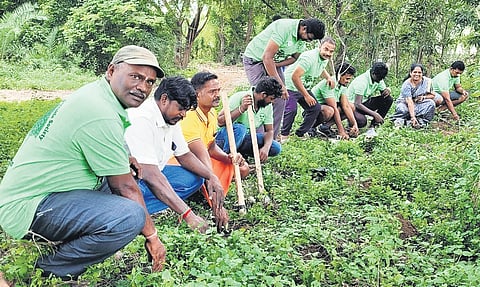

PUDUCHERRY: Beneath the scorching sun, where the sands of Pondy Marina glisten like gold, D Anandan, whose hands are calloused from nurturing plants, stands as a silent guardian in front of a banyan tree.
The 55-year-old man from Pooranankuppam in Puducherry is not just a caretaker of trees — he is their saviour, their voice, and the one who breathes life into their roots once again.
On that sunny day, he was inspecting the banyan tree he transplanted from Auroville, where trees were being uprooted for development work a few years ago. It was not an isolated act, in fact, he has given life to 45 trees that were either cut down or uprooted.
For Anandan, who works as the manager at Perunthalaivar Kamaraj Krishi Vigyan Kendra (PKKVK), love for nature is not just a fleeting hobby but a lifelong calling. His journey began in 2013, two years after winds of Cyclone Thane swept through Puducherry. For most, the aftermath was a blur of debris, but for Anandan, it was the heart-wrenching sight of countless trees, toppled and broken, that stirred him to action. “It was heartbreaking to see the trees that once lined our streets reduced to debris,” he recalls.
And so, he embarked on a mission, one rooted in hope and nourished by his resolve, to revive trees. Yet, like many noble causes, the road was not smooth. His initial attempts at transplantation were fraught with disappointment. “At first, I transplanted all kinds of trees, but many died. It was disheartening,” he recalls. After consulting botany experts, he learned that certain trees—particularly banyan and peepal—have a better chance of survival when transplanted. Armed with this knowledge, Anandan refocused his efforts, on saving trees threatened by both human actions and natural calamities. “It costs between Rs 15,000 and Rs 20,000 to transplant a single tree, and it requires manpower,” says Anandan. More often than not, he digs into his own pockets to cover the expenses, though he occasionally receives donations from volunteers and private sponsors.
With the help of these volunteers, Anandan has planted over 700 trees in Puducherry town alone. He also plants saplings along roadsides for residents, sometimes offering his services for free or charging only for fencing.
But perhaps the most enduring symbol of his work is the palm tree - the state tree of Tamil Nadu and a representation of its cultural and ecological identity. Since 2016, Anandan has earned the moniker ‘Panai Anandan’ for his relentless campaign to preserve and promote panaimaram. He has sown lakhs of palm seeds across Tamil Nadu and Puducherry, working tirelessly to raise awareness about the tree’s importance. “The palm tree is like the peacock, our national bird. Cutting it down should be treated as a serious offense,” he says. He laments that it wasn’t until 2021 that a law was introduced requiring permission to fell palm trees. “Before that, lakhs of trees were axed for firewood and brick kilns.”
The palm tree, he notes, has been central to Tamil life for centuries yet its significance has diminished in recent years. The trunk was once used as pillars for homes, the leaves as roofing material and writing surfaces, and the fruit and seeds as food sources.
Through his Dhanasundarambal Charitable Foundation, based in his native village, Anandan continues his mission, planting palm seeds on unused public lands in the hope of restoring what has been lost.
When allowed to speak by a Tamil organisation at the unveiling of a Thiruvalluvar statue in France recently, Anandan spoke about the significance of palm trees and its mentions in the Tirukkural. He has delivered similar talks in Singapore and Malaysia and plans to return to Singapore soon to plant palm seeds, following requests from volunteer groups there.
For Anandan, the ultimate dream is to see palm tree restored to its rightful place in Tamil society, not just as a relic of the past, but as a living, breathing part of everyday life. “Preserving our ecosystem by growing trees is essential,” he adds.
(Edited by Adarsh TR)